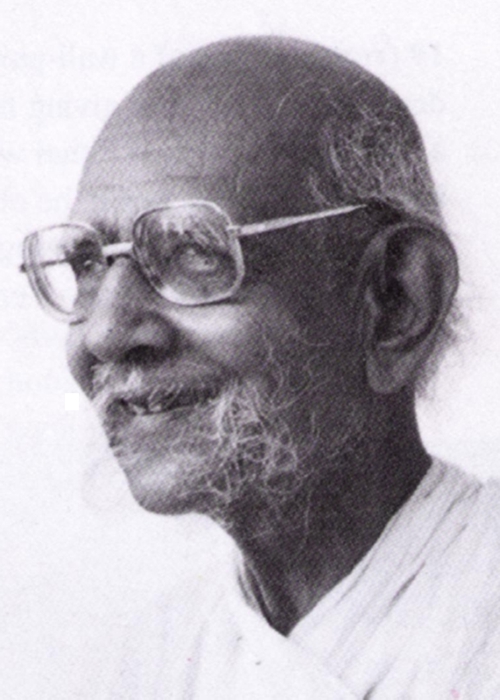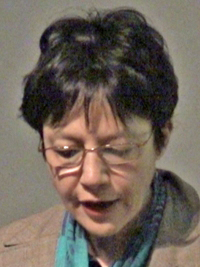 The 12th November 2009 will remain as a gloomy day for everyone as it brought the shocking and sad news that a jewel of knowledge and kindness has suddenly disappeared from this earth.
The 12th November 2009 will remain as a gloomy day for everyone as it brought the shocking and sad news that a jewel of knowledge and kindness has suddenly disappeared from this earth.
I am not among the scholars who sat in long discussing sessions with Muni Jambūvijayajī, but I had the privilege to meet him and have his darshan a few times during the last 30 years. Each meeting, however short it was, was inspiring and ennobling. Keen on teaching one topic or another of dharma and emphasizing the importance of vegetarianism, Muni Jambūvijayajī never failed to mention the name of his guru (and father), Muni Bhuvanavijaya, and Sankheshwar, a place where he always used to go back. His mother, an aged nun, was often around, in the sādhvī upāśraya. During one of my first stays in Gujarat, in 1980, I went with Dr. Kanubhai V. Sheth to Pātarī, a remote village near Upariyala and Viramgam, where Muni Jambūvijayajī was staying for the rainy-season. I was transfixed by this encounter, my first one with a Jain monk, and by the vyākhyāna which he delivered later in the afternoon. It was easy to see how much respected he was by all. I felt extremely moved when Muni Jambūvijayajī presented me with the first volume of his edition of Hemacandra's Yogaśāstra with svopajñavṛtti, which, indeed, was the most appropriate book for me to read at that stage of my studies. The clarity of this edition, one among many others that Munijī has to his credit, and the vast erudition displayed in the critical apparatus which renders full justice to the wealth of material contained in the vṛtti by providing so much information, textual parallels, etc. are impressive. I was so keen to make this stimulating work known to others that I decided to write a detailed review of it (published in Journal Asiatique 1983, pp. 428-432). Later on, I had the opportunity to meet Muni Jambūvijayajī in Palitana, in Sankheshwar, and, for the last time, in December 2003 on the day he had arrived in Koba. Followed by his retinue, he was welcomed in great pump by all those who were present. This is indeed a cherished memory of a striking moment. With gratitude I then received from him a copy of his edition of Hemacandra's Śabdānuśāsana with Laghuvṛtti. This is a book I constantly use, especially for my investigations in Jain praśnottaras. They include the modest contribution I wrote for Jambū-jyoti, the felicitation volume in honour of Muni Jambūvijayajī (2004) and the one published in this commemorative issue of Anusandhān.
Muni Jambūvijayajī's activity is in direct continuation of that of Āgamaprabhākara Muni Puṇyavijaya to whom he paid an appropriate tribute on the occasion of the latter's completion of 60 years as a monk (see Jñānāṃjali. Pūjya Muni Sri Puṇyavijaya Abhivādana grantha, Mumbai, 1969, khaṇḍa bījo, pp. 17-18). Like his illustrious predecessor, Muni Jambūvijayajī devoted a lot of his energy to produce high standard editions of several texts of the Svetāmbara canon and was involved in the continuation of the Jaina Agama Series. His vast expertise in philosophy, logic (Buddhist logic as well) and grammar resulted, among other things, in the monumental edition of Mallavādin's Dvādaśāranayacakra. This work of great importance for the history of Indian philosophy has aroused the interest of many western Sanskrit scholars in recent years and has made the name of Muni Jambūvijayajī familiar even to those whose primary concerns do not relate to Jainism. Several of us have benefited from Muni Jambūvijaya's knowledge which he was always ready to impart. His interactions with foreign scholars, who for some of them became his true disciples, also led him to write a few articles (in Sanskrit) for books published outside India. His āśīrvāda and contribution were requested for more than one scholarly occasion connected with Jain studies in Europe! I remember the Jain Conference organized in Warsaw (Poland) by Piotr Balcerowicz, where a message in beautiful Sanskrit written by Muni Jambūvijayajī was read to the participants. An auspicious beginning, indeed.
Muni Jambūvijayajī's action went much beyond his own publications. A highly respected figure of the Jain community, he also considered his duty to improve the state of Jain libraries, and to guarantee the preservation and accessibility of the manuscripts. Such is the message he also conveyed in the Foreword he wrote to our Catalogue of the Jain Manuscripts of the British Library (2006), underlining the importance of preserving and cataloguing the heritage of Jain manuscripts in India as well. Indeed, his name will remain for ever attached to the Jaisalmer and the Patan bhandārs. Not only did he produce with his team a new catalogue of the Jaisalmer libraries. Open to the useful innovations of modern technology, he undertook the digitization of manuscripts in these two illustrious places. As reported by Royce Wiles, an Australian scholar who was present during a few months of 1998 when the project to replicate the Jain manuscripts in Jaisalmer was undertaken, "Muni Jambūvijaya on more than one occasion laid emphasis on the need to use the very best technical methods now available to pass on to future generations the spiritual/cultural heritage contained in these MSS. No expense was spared in setting up the equipment of the project and the technical facilities procured were in my opinion world-class" (Bulletin d'Etudes Indiennes, Paris, 16, 1998, p. 163). From what I know, the work in Patan has just been completed in spring 2009. Such achievements will remain for ever. We only hope that, inspired by Muni Jambūvijayajī's example, other people will continue to work in the same direction.
Muni Jambūvijayajī was truly the embodiment of perfection in knowledge and in character. One cannot but admire his simplicity, earnestness, commitment and energy both mental and physical, until the last instant of his life in this world.
c/o Sorbonne-Nouvelle University Paris,
France.
 Prof. Dr. Nalini Balbir
Prof. Dr. Nalini Balbir